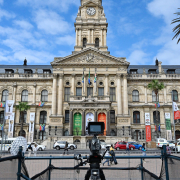|
Getting your Trinity Audio player ready...
|
The Government Transparency Institute and Transparency International Health Initiative (TIHI) recently published a report focusing on open contracting in low- to middle-income countries (LMIC), with a specific focus on reform strategies for the procurement space.
Public contracting is the world’s largest marketplace, with $13-trillion changing hands every year – but opacity and secrecy means that for some 97% of that staggering amount, taxpayers don’t know where their money is going. This opens the door for corruption and abuse of the system for personal enrichment. And since the arrival of the Covid-19 global pandemic many fingers have reached greedily for the emergency funds made available.
Open contracting is an effective way of combating corruption in public procurement, because it calls for open and timely information on public contracting to be made easily accessible to anyone. This allows civil society organisations and other interested groups to monitor public spending and swiftly expose any misuse of the public purse.
“Publishing full details of public contracts makes the enormous public procurement market more efficient and competitive … with the right information, governments can get better prices, drive economic growth and protect citizens from unscrupulous actors who are determined to rip off the public finances,” says open data company Spend Network.
CW’s leading role in open contracting
The new report, titled Modelling Reform Strategies for Open Contracting in Low and Middle-Income Countries, aims to evaluate the effectiveness and fit of open contracting reforms to LMIC contexts and to provide recommendations on how and when countries should pursue open contracting reforms.
South Africa was one of nine LMICs surveyed – the other eight are Bangladesh, Indonesia, Kenya, Nepal, Nigeria, Tanzania, Uganda, and Zambia. All of them, says TIHI, are at different stages of the reform process regarding transparency in public procurement
Corruption Watch is a leading player in South Africa’s open contracting space, and was a contributor to this LMIC report. Since 2018 the organisation has been working to improve transparency in healthcare procurement as a participant in the Open Contracting for Health (OC4H) project, which aims to make public procurement in national health systems more transparent.
With support from TIHI, Corruption Watch has implemented activities to improve health outcomes and increase public trust in national health services. The organisation recently convened an informal working group on open contracting, bringing in other civil and academic players from this field.
Join the Government Transparency Institute and Transparency International Health Initiative, with Corruption Watch, for a webinar on South Africa’s efforts in respect of open contracting, as reflected in the report.
Date: 4 December 2020
Time: 11h00 to 12h30 (SAST)
Venue: Zoom
Register here
Reform more impressive on paper than in practice
For all countries, the findings show a clear lag between progress in reforming the legal framework and progress in its implementation. In other words, the report notes, legal reform is only the first step towards change.
Other important factors for successful change include political will and capacity, ‘tone at the top’, and consistent leadership in key institutions charged with implementation.
But because public administration in LMIC generally struggles to carry out its duties and provide public services, transparency is often seen as a luxury – even in willing governments which are open to reform. “Capacity constraints manifest in several ways: poor record management, lack of specialist procurement skills, and weak ICT skills and infrastructure.”
The situation in South Africa
Compared to other countries of similar or lesser development status, the report states, South Africa’s public procurement system remains a long way from being efficient and transparent. This situation is attributed in part to the state capture era under former president Jacob Zuma, where widespread looting of public resources and the resulting cover-ups of malfeasance became an accepted practice.
“There is a widespread recognition that the resulting secrecy has enabled the destructive spread and scale of corruption in procurement processes. Drastic changes are urgently needed.”
The report notes some recent positive developments, such as the publication by National Treasury and some provincial treasuries of data from Covid-related procurement. In addition, it says, “there appears to be political shift in favour of transparency of procurement data under President Cyril Ramaphosa”.
Other sporadic exercises in procurement transparency are mentioned, such as the online supplier database and eTender portal developed by National Treasury. But because not all of government’s information technology systems are integrated into this project, a comprehensive procurement data system is not yet possible.
Then there is the Western Cape’s open tenders platform, and National Treasury’s InTACT Toolkit for cities, which also promotes open contracting systems. Treasury has also created the Municipal Money platform, which allows for budget monitoring and aims to include procurement information.
The Vulekamali project is singled out as the largest sub-national effort to publish procurement data. This is a joint initiative of National Treasury and Imali Yethu – a coalition of civil society organisations and government representatives, of which Corruption Watch is part. The aim is to make government budget data and infrastructure procurement data available and accessible.
These varied initiatives demonstrate that there is some political will and interest to reform public procurement. The stumbling block is South Africa’s decentralised procurement system, coupled with a poorly resourced department, with some politically powerful blockers and state inertia thrown in. Up against these barriers, says the report, “the existing political will does not suffice to implement far-reaching reforms that could substantially open up procurement data”.
Recommendations for South Africa
- Given the economic downturn in South Africa and that it is one of the countries hit hardest by the Covid-19 pandemic, value for money in procurement and especially in the health sector is going to be a very salient topic in the near future. One approach could be to learn from the Vulekamali Infrastructure Transparency Portal and extend from this experience to the health sector.
- The currently tabled procurement bill poses a great opportunity to shift the legal framework towards including and clarifying transparency requirements in public procurement. Civil society should use all the advocacy tools at its disposal (such as commenting on the draft, as Corruption Watch and Open Contracting Partnership have done) to support this shift.
- In the absence of obvious entry points for civil society to cooperate with Treasury/Office of the Chief Procurement Officer on open contracting, another useful national level strategy that Corruption Watch has taken is to map all the existing government websites publishing procurement data in some form and compare it to the Open Contracting Data Standard and legal requirements. This will be a useful advocacy tool to engage government entities on how to better publish procurement data. This approach might receive a more or less receptive response depending on the government entities and individuals working with procurement information.
- Another opportunity would be to capitalise on the strong sense of social accountability across South African society (and their oversight institutions of the Auditor-General and the Public Protector) and expand that to the field of procurement. This could include awareness raising activities on how public procurement affects citizens, particularly focusing on public services. One promising route could be to link procurement to public participation in budgeting, which is relatively strong and widespread across South Africa.








